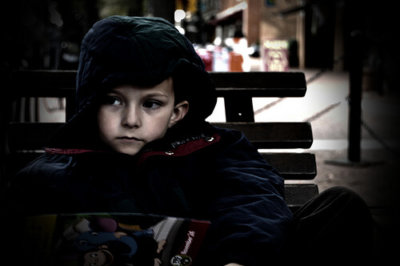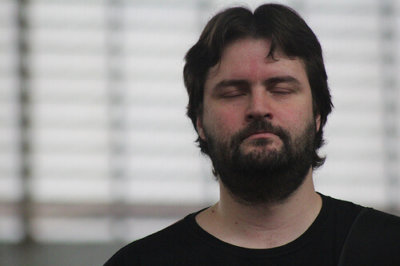Is This the REAL Reason You Feel Like a Failure?

By: miss.killer!
Feel like a failure when a work presentation or first date doesn’t go the way you planned?
If you manage to bounce back in a couple of days (or weeks if it’s something harder, like a breakup), then you probably have healthy amounts of resilience and self-worth.
But if you constantly feel like a failure, no matter what you do? Then it might be a much deeper issue.
What do deep-rooted feelings of failure look like?
- Do self-help attempts to ‘learn from your mistakes’ or ‘notice your achievements’ do nothing to stop you feeling a failure?
- Even if you achieve things, do you still feel anxious?
- If you listen to your mind, is it largely negative thinking?
- Do you always compare yourself to others (and they always look better)?
- Do you even do things that sabotage your success but it’s as if you can’t stop yourself?
- Do you feel like an impostor, as if any moment someone will arrive to tell everyone you don’t deserve what you have?
- Do your feelings of failure sometimes come with low moods or full-blown depression?
Why do I feel like a failure no matter what I do?
Constant feelings of failure can rarely be solved by present-day achievement because they have roots in your childhood.

By: familytreasures
What we experience when young can leave us with a set of core beliefs (assumptions we think are facts) that mean we see the world from a place where we can’t win. This is why even when someone else points out our long list of achievements, we feel nothing.
What sort of childhood leaves you feeling a failure as an adult?
Childhood trauma is the most obvious cause of feeling a failure as an adult.
Abuse in all forms – sexual abuse, physical abuse, and emotional abuse – damages self-esteem in ways that are pervasive.
But research shows that childhood can be far from traumatic and still leave us feeling a failure.
My childhood wasn’t terrible. So why do I feel a failure?
A childhood that leads to being an adult who is confident and resilient turns out to be no easy recipe.
So even if your parents meant well, the following can leave you less able to feel successful as an adult:
1.You had a parent who did everything for you.
A 2016 study at the University of Singapore found that ‘helicopter parenting‘ was linked to children who were anxious, depressed, and suffered low self-esteem. Later assessments of the children found that 60% were highly self-critical, with a shocking 78% struggling with perfectionism.
2. You experienced constant criticism.
Even well-meant criticism from a parent can mean you carry on the pattern of criticising yourself as an adult, with an inner soundtrack of self-judgement that blocks ever feeling a success.
3. You were supported, but there were hidden high expectations.
Your loving family might have had built-in expectations that your personality just didn’t match. Perhaps you come from a long line of family men with practical jobs and you are a single artist. It can mean you live with a nagging feeling you’re failing even when doing well.
4. You were heavily rewarded for being good, quiet, helpful, etc.

By: Benedic Belen
Was praise heaped on you if you were good? But was the parent you adored then emotionally unavailable if you dared to be sad, or voice an opinion they didn’t like?
This leads to a child who reads cues in order to please others. Which leads to an adult taking their value from guessing and meeting others needs. Of course it’s impossible to please all the others, all the time. The result? A constant sense of not being good enough.
5. You didn’t have proper ‘attachment’ with a parent.
Attachment theory believes that for a child to grow up into a confident adult, the child must be able to fully trust and rely on at least one caregiver. If your main caregiver instead was distracted, emotionally unavailable, or otherwise unable to give you the acceptance and attention you needed, you can grow up with an incapacity to maintain relationships. This can leave you feeling constantly flawed.
6. You had a parent who felt like a failure.
If a parent or main caregiver suffered from low self-esteem and feelings of failure you might have have taken on board this way of being through what social cognitive theory calls ‘observational learning’ or ‘observation and modelling’.
7. You were bullied as a child.
Enough about your parents. Some of us feel a failure all the time as an adult because we were bullied at school. Research carried out at Duke university connected bullying in childhood to anxiety disorders, depression, and panic disorder in adults. Hard to feel a success in the face of such challenges.
When the self-help just isn’t working

By: Alberto ….
As you might be realising, such deep-rooted feelings of failure won’t go away by finding that perfect job or the right partner.
Furthermore, feelings of failure rooted in childhood tend to come alongside very real mental health issues that include:
- anxiety
- depression
- low self-esteem
- personality disorders (dependent personality disorder, borderline personality disorder).
So self-help books are a great start.
But shifting such deep-rooted feelings of failure, especially if they are causing any of the mental health issues above, is often best done with the support and safe space that therapy can provide.
A good therapist can help you spot your core beliefs and your assumptions and process the feelings attached to the experiences that formed them. He or she can also help you slowly retrain your thoughts to a more positive perspective of yourself that includes self-compassion.
What sorts of therapy help with ongoing feelings of failure?
There are many kinds of talk therapy nowadays that can help you with all this.
Psychodynamic psychotherapy helps you deep dive into how your past has created all your current ways of feeling and acting.
Schema therapy works to identify and change the patterns you live out in life, including the ones that see you constantly recreating failure.
If you want to try a shorter-term psychotherapy, cognitive behavioural therapy (CBT) helps you recognise and challenge your negative thoughts, and learn to quickly replace such thoughts and take better actions in life.
And person-centred therapy is a great choice if you just want to talk, on your terms, and have someone warm and understanding listen and reflect back.
Harley Therapy connects you with counsellors and psychotherapists who can help you overcome longstanding feelings of failure. Meet a therapist in one of three central London locations, or over online from wherever you are in the world.
Do you want to share your story of feeling a failure with our readers? Or have a question about feeling a failure? Use our public comment box below.





Thanks <3 I appreciate the time to write and publish this posts
Glad to be of help Augusto!
i have never found anything that i excel at, enjoy or am passionate about . I try to pack my waking hours with work, volunteering, church worship, exercise and evening classes, to avoid wallowing. I have been on dates with over 100 women, but had few lasting or intimate relationships. i do not get on with people in general, and find it virtually impossible to get close to anyone or to stop them abusing me emotionally or psychologically.
Hi Marco, there is a lot going on here. Have you ever considered talking to someone about it? We can’t really give any kind of feedback or diagnosis as we’d need to know you and a lot more about you. But we would say there is bound to be something behind this and that a good therapist could definitely shed some light and help. Best, HT.
Hello, My name is Troy. I live in the Us. (Los Angeles) I’m 55 and I have no clue. on how to be Happy, any faith, any belief, Any confidence, suffer from depression, low self esteem. You name it. when you’re not good in the beginning of what I like to call the United States Sadistic School system early on. It is designed and set up for those who aren’t gifted scholastically. . To give you low self esteem, lack of confidence, a feeling of not belonging, criticize, bullied
etc. Then when you have not a great home life in a lot of respects. A over baring self absorbed step father. (later on feeling abandon by my nature father) for the most part a functioning acholic and a Mom who wasn’t good at school either. (Learned a very good reason why she wasn’t about a year before she passed away) at times was a Non functioning acholic. When she was on, she was on. But? They yelled and screamed at each other which felt like most of the time. There was never 2 days in a row of what would be considered quite time. I think that really can play with one’s psyche Of course I wasn’t smart enough to go the college. I wanted to go to Berklee School of Music in Boston. Me taking the SAT’s was such a joke and a waste of time and money. I had no clue of what to study, No idea what to expect. No clue at all. I scored under 700. So of course No chance of going to school. Music is really the only thing I’m good at most days. But I don’t wanna teach. Kids are now way to lazy with cell phones and social media. I’m like I don’t care what your paying me. Don’t waste my time. Because of the Sadistic school system I’ve always felt ashamed of myself. Example when I’ve play gigs with my singer. When our set would be over. I’d pack up my guitar and wait outside for him to come out. I don’t socialize with the audience inside, because I’m always afraid and embarrassed if they are going to ask me questions like what do you do for a living, where did you go to school. etc. I’ve pretty much have always been ashamed of myself. Was married once. That didn’t work at. I was a step parent and she was a CA parent. (won’t go into that) Then I meet someone who was absolutely wonderful and I got depressed because of my life in general, no career wise or choice of anything and for some reason when both my parents passes away within a year and half of one another . I don’t know what happen. something just snapped I guess and the depression really went into over drive so to speak. I have no idea why. I was glad that my step dad was s dead. Felt sorry for my mom. But that’s it. So??? My girl friend gave me an ultimatum of sorts and I just couldn’t pull it together and so she left.
Hi Troy, so what we see here is a combination of low self-esteem, depression, and rage. But more than that, we see cognitive distortions. Your mind is addicted to negative thinking loops, which keep us stuck in depression. And the more we refuse to see anything but the negative, the more we unconsciously make choices to reinforce the negative. So we feel low, make a bad decision, feel low, make a bad decision…. it’s an endless cycle. We teach our brain to ignore all the personal power and gifts we have in favour of the belief we are useless. But that’s not a fact it’s a belief. We would highly, highly suggest you seek support. These things can be changed, but you’d need to commit to doing the work and believing in the process. People-centred therapy might be a good idea, it involves helping you recognise the inner resources you already have and it’s very empathetic. Otherwise there is a short term therapy called CBT that would definitely help. It focuses not on your past but on your current day thinking issues it helps you change your thinking. If you are on a low budget we have an article on finding free to low cost therapy here http://bit.ly/lowcosttherapy. Best, HT.
I’m Matt. 30. I never forgave myself for dropping out of college when I was younger. Now i work a job, where I excel, but I absolutely hate it. Its not even close to what I want to spend my life doing, but have no training/experience doing anything else. School isn’t am option, have to pay the bills. My younger brother finished college and makes 5 times my salary, and I constantly compare that to what I’ve made of my life. I hate my job, I hate living where I live,and I feel trapped here. Need a better job to move away but no way to get one. Feel absolutely trapped where I live and in a career I hate. I feel hopeless about everything ever working out and that just sucks away my motivation to even attempt anything new. I used to have passions and hobbies, but don’t do them anymore because I feel like my soul has just vanished. All I can think about is that this is where and what my life is going to consist of until I die and it doesn’t seem worth the effort
Hi Matt, so what we see here are a lot of what in psychology are called ‘cognitive distortions’. Where you have convinced yourself something is ‘true’ and ‘final’ when it’s actually very much an assumption, or black and white and extreme thinking. Our thoughts and our inner core beliefs about ourselves and the world affect every decision we make, down to each tiny micro decision. If, for example, you feel you are unworthy, your unconscious mind will consistently drive you to make choices that ‘prove’ this true, and you’ll lead a life full of self sabotage. And this sort of deep, hidden belief tends to form in childhood, and can come from things like parents who prefer one child or who don’t give you the love and attention you need, or from any kind of childhood trauma or neglect. The good news – it’s actually possible and not always even that hard with the right support and a lot of courage and willingness to change to totally change your thinking, and therefore start to bit by change your choices, your self belief, and your life. We’d suggest you look into CBT therapy as a starting point, it’s a short-term therapy where you don’t even talk about your past much but you focus on learning to recognise, challenge, and change the thinking that is driving you to always feel terrible and create a life you don’t like. From there you might want to try a deeper, more longer term therapy, that helps you recognise your inner resources, your own values over those of your family or what you think you ‘should’ want, and to keep making a life for yourself that works for you. This might be a therapy under the humanistic school of thought, or something like existential therapy. What matters most is finding a therapist you feel you could grow to trust and then sticking it out even when it gets tough. Best, HT.
Hello. I’m a 70 year old female who frequently feels like a failure. My feelings are exacerbated by my having been excluded by a group of friends and by finding it difficult to make new friends. I join Zoom groups, send birthday texts, and volunteer with a support line to connect with others, but still find myself alone most of the time except for my pets. Your article helped me gain insight into my feeling of being a failure. Thank you.
I have accomplished much in life, more than perhaps most, but I never achieved any noteworthy professional success. It’s strange because I should live with joy and gratitude but I want to be successful. I have done many types of creative work. I have released records through record labels and on my own, had my art shown, made a feature length film, written and illustrated a children’s book, written a self-help book for creatives, went back to university and graduated with highest honors … and this is not even everything, just a few highlights.
People say you have to focus on only one thing because if you try to walk many paths you go nowhere. I understand this but, as a creative person, I can’t do only one thing. For example I can’t make a second film without resources. I also contacted many (in the thousands) of people trying to get my foot in the door in the industry, and I was completely ignored. So I shift gears and work on music. I made a quadruple album that was named Album of the Year by a respected radio show in Germany, but nobody else really cared. Still trying to figure out the next film, I focused on art.
My creative work gets great reviews, but nobody else seems to care. My first love was music but I got into film because I was trying to find a way to combine everything I love into one thing, thereby being on a single path instead of many. But as you see that went nowhere. The next try was with art, with the same idea. So far, nothing.
I have put forth a Herculean effort in life and I have overcome great adversity. I am grateful that I have this otherworldly level of creative energy, but it is frustrating to do all the work, make sacrifices, constantly improve personally, professionally, artistically and spiritually, get the good reviews and still be absolutely nowhere, unable to succeed artistically or have a normal life, either. In spite of my efforts, I have been generally rejected by the whole world. It’s surreal to be afforded the opportunity to do all this yet feel rejected. It feels like I do not belong in the world.
Creative work is something I have to do. It’s not a choice on my part, but I love it. It’s my version of being a fish in the water. At some point, however, I begin to wonder what the point of all this effort is, what the point of even being alive is, when I make all these sacrifices and still get rejected by the world.
I believe you are leaving out some relatively significant reasons that this can occur outside of your parents, your childhood, and bullying.
1) Social Expectations – I’m not talking about expectations your parents, friends, or authority figures had for you, but misrepresentation of what life should be provided by acquaintances, and the media. For instance there is an entire generation right now who have been taught what living conditions they should expect from tv shows like “Friends” where a barista and chef or mostly out of work actor and statistical analyst can afford massive apartments in a good neighborhood in New York. Or that love and romance are supposed to be easy, and have a lot of up and down drama to keep it interesting and emotionally intense rather than the boring drudgery most healthy relationships fall into. It plays off the human need for social acceptance and status, and when they find that life is not the way that has always been taught to them by our entertainment mediums, it can be a debilitating blow to their ego and belief in themselves causing a feeling of being a failure, discontent, self recrimination, and resentment towards society.
2) Another possibility is health issues, whether they be mental or physical. Chronic health conditions. Especially unpredictable ones that leave you feeling mostly normal for a while then show up again at the most inconvenient times sapping your energy, your motivation, and your ability to accomplish the goals you’ve set for yourself can over time have a debilitating effect on your self esteem, and can leave you in an existential crisis or depression that can be very difficult to overcome. When your body or mind fails you every time you need it most, it can set you into a perpetual why even bother trying mindset.
Can you please tell me can a person experience unbearable and many devastating failures? Is there such a thing as too many failures that have actually ruined a life?
Hello,
I have looked at schema therapy and I understand why I feel as I do, but all the practice I do and all the work I have done for years still doesnt shift that core belief that the only way I can be accepted is to do what others want and that I am never good enough. Rationally I know its totally rubbish, and i understand its origins, but I just cant seem to change. Have been in psych for years – very little has helped. Do you know what I can do to shift those core beliefs? Or do I have to stay like this forever..it is unbearable
I excelled all through college. I continued to study even after Engineering school. I have a Masters degree. I continued to learn and experiment in my home lab. The way the industry is nowadays, they wont let me do any real work. Every time I get a new skill they decide we dont do that anymore. I am given duties that I have to study up and get very productive very quickly. I have achieved what they wanted and needed just to have it taken away because we dont do that anymore. I am tired of being their stop gap. I have great breadth but i am missing depth because they wont let me keep things very long. Because of this I have not achieved any of my goals. I cant quit, still have one child in college. My life insurance is the only thing I have going for me.
I am a failure. I have failed at everything I have tried to make life worth living. Everything has fallen apart. Never been in a relationship. No one has ever been interested in me. Most people shun me, or call me everything but human. I’ve actually been beaten up just for saying hello. I’ve had complete strangers throw things at me for no reason. I have no skills, talents, or abilities that I could use to make life better. Even God wants nothing to do with me. 45+ years as a Christian with absolutely nothing from/of God. I just exist, not live. I have nothing meaningful in my life. How can I not be a loser?
I am a failure because god carefully crafted me to be one long before I was even conceived. Failure is not just what I do, it IS what I am. I used to think that there was a me on the outside with a core of failure but years ago I realized there was no me on the outside, there was only failure through and through. And my past proves it beyond any doubt. Years and years of complete failure, XXXXXX. How pathetic is that?